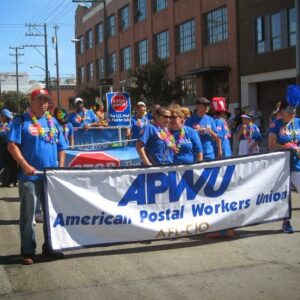March 3, 2026
Collective Bargaining Can Be Win-Win
(This guest editorial by APWU President Cliff Guffey was published on Politico.com on April 5, 2011. [PDF])
Public-employee unions and their employers can make collective bargaining work – even when faced with a financial crisis.
The American Postal Workers Union proved this last month, when they reached a tentative agreement with the U.S. Postal Service that benefits both sides.
Unfortunately, some anti-labor politicians can’t stand that thought. When Wisconsin Gov. Scott Walker insisted on gutting the collective bargaining rights of teachers, nurses, and snow plow operators in his state – despite their willingness to make major concessions – he wasn’t worrying about balancing the budget. He was challenging basic American values: freedom, fairness and the right to negotiate for a better life.
Unfortunately, far too many governors and lawmakers across the country are following his lead.
But I’ve seen first-hand that the process can work.
Reaching a settlement for our agreement wasn’t easy. In the past three years, more than 100,000 postal jobs have been eliminated. As a result, thousands of middle-class union members have been forced to sell their homes, uproot their families and move hundreds of miles from their neighborhoods – often with as little as 30 days notice.
The problem is that, in the last fiscal year alone, the Post Office suffered an $8.5 billion shortfall. But not, as some suggest, because of excessive labor costs.
A little-known provision of the 2006 Postal Accountability and Enhancement Act has pushed the Postal Service toward insolvency by requiring the agency to pre-fund future healthcare payments – a burden no other government agency, or private company, is forced to bear. Without this requirement, the Postal Service would have had a $611 million surplus over the last four years.
Despite the Postal Service’s financial crisis, however, collective bargaining gave the union a say in decisions that affect our livelihood and our daily lives. It provided a process that can benefit both workers and the Postal Service.
For union members, the priority was safeguarding jobs and limiting long-distance reassignments. Management wanted greater workforce flexibility and lower costs.Through collective bargaining, we were able to reach an agreement that did all that.
Work that had been outsourced is now to be returned to postal employees. That will save the USPS money and protect jobs because outsourcing can often be more expensive than doing the work in-house. In addition, strict limits will be imposed on long-distance reassignments.
There also will be an increase in the percentage of non-career workers, lower salaries for future employees and an increase in employees’ share of contributions for health insurance.
Neither side got everything we wanted, but collective bargaining allowed both sides to make substantial progress toward our major goals.
And the agreement not only helps our union and the Postal Service, it benefits everyone who’s ever received a package or a letter — and helps keep our economy humming. The agreement helped avoid harsher cuts to existing service.
Correcting the pre-funding requirement is essential to the Postal Service’s long-term stability. Protecting collective bargaining is as well.
The outcome speaks for itself. The APWU and the Postal Service achieved an agreement many thought was impossible.
Cliff Guffey is the president of the American Postal Workers Union. He testified Tuesday about this agreement before the Committee on Oversight and Government Reform.


